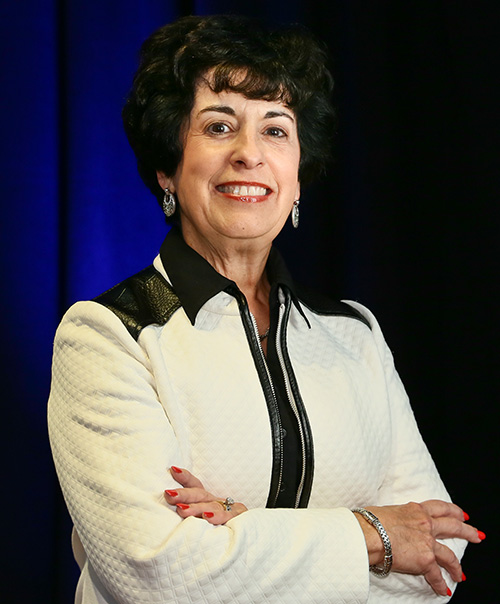Millie Pilié Bradley (A&S ’73, MBA ’75) was a few weeks into maternity leave her second child when she got an unexpected phone call from her boss.
It was 1983, and Bradley, a systems manager in Exxon’s chemical division in Houston, had recently decided to work part time when she returned from her leave.
Her boss told her he’d just heard about an incredible opportunity in Exxon’s Toronto office, one that would make her the division’s first female executive. Despite having signed off on her plans to go part time, he said he felt obligated to tell her about the job.

Millie Bradley spent 34 years with Exxon and its subsidiaries, eventually retiring as general auditor of Exxon Mobil in 2009.
“I very professionally chatted with him and hung up the phone and called my husband and said, ‘You’re not going to be believe the crazy conversation I just had,’” Bradley recalls with a laugh. “And my wonderful husband, Allan, said, ‘Hang up, call back and tell him you’re taking it.’ So off we went to Toronto with an infant and a toddler — and the rest is history.”
That job, downstream marketing information systems manager, launched Bradley’s career into a new trajectory, one that would carry her through the next 26 years at Exxon. She went on to serve in a variety of executive roles across the corporation, including assistant controller of Exxon Mobil Corp. and global controller of ExxonMobil Chemical. She retired in 2009 as general auditor of Exxon Mobil.
“Nobody expects to work in the same company for 34 years, but the nice thing about Exxon was that, certainly in the early years, I wasn’t in the same job for more than two or three years,” Bradley says. “Exxon has one of the best management development programs in the industry. I was constantly moving and learning and taking on new jobs as if I was changing companies, but I was still under the Exxon personnel development umbrella.”
A native of New Orleans (and direct descendent of Joseph Pilié, the surveyor who helped design the city in the early 19th century), Bradley graduated from Tulane with a bachelor’s degree in mathematics and an MBA with a concentration in finance and organizational behavior. After interviewing primarily for finance jobs, she met with Exxon’s IT manager in New York, and the two hit it off.
“In those days, business people had limited computer knowledge, and corporations relied on extensive IT organizations for all technical support,” Bradley says. “Exxon used MBAs with technical backgrounds as internal consultants who could learn the technology and at the same time communicate in business terms to the users within the company. I had very little computer training at Tulane — remember Fortran programming and punch cards? Exxon provided the technical training, and we brought the business skills.”
Working in IT had other benefits as well, Bradley says.
“It was a good way to see the company, learn the business, acquire new skills and then determine where I could apply those skills in future areas,” she says. “It was a great opportunity to grow and advance in my career.”
Since her retirement, Bradley has devoted herself to work with nonprofits, including serving on the boards of the United Way Foundation of Metropolitan Dallas and Girl Scouts of Northeast Texas. She participates in angel investing in entrepreneurial companies run by women and does leadership training focused on ethics and C-suite communication. She’s also become more involved with Tulane. In 2015, Bradley and her husband provided funds to establish the Millie and Allan Bradley Innovation in Ethics Education Grants Program, which awards grants of up to $10,000 to Tulane faculty from across all disciplines to support the development of innovative teaching materials on ethics.
“It’s incumbent upon leaders to set up environments where people can make ethical decisions,” Bradley says. “It doesn’t matter whether you’re in accounting, IT, engineering or health care. Leaders need to establish sound control environments and policies, train employees well, and then use strong leadership skills to encourage openness, accountability and a supportive environment where individuals make ethical choices.”
So what advice does Bradley have for today’s business school graduates? Not surprisingly, it harkens back to that fateful phone call more than 30 years ago.
“Prepare well, choose your jobs wisely, work harder than anyone else and always be open to new opportunities,” she says. “Sometimes we try and over-plan our lives and our careers, and we may shut the door on an opportunity that’s presenting itself, like my Canadian opportunity, which ended up being pivotal. I’ve counseled a lot of people over the years about career decisions, whether it’s overseas assignments, relocations or jobs in new, unfamiliar areas. I always say, ‘Why not?’ Take the opportunity and go with it. The details end up working themselves out.”

